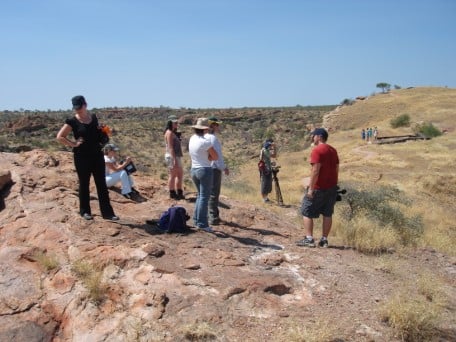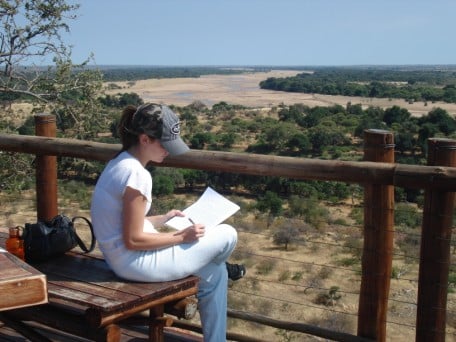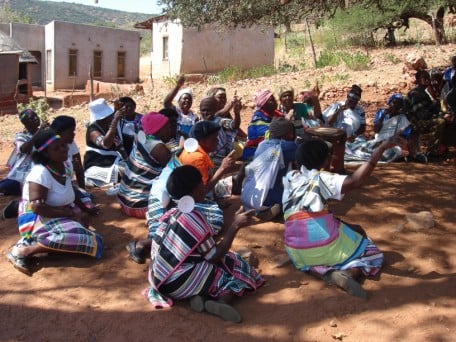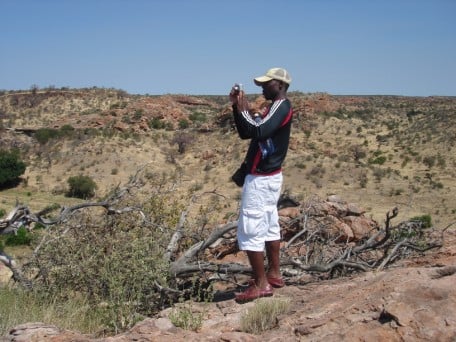The ten-person team comprised lecturers and students from the Departments of Drama, Anthropology and Archaeology. Dr Alex Schoeman of the Department of Anthropology and Archaeology is the site specialist. She is a senior researcher on Mapungubwe. Dr Schoeman was a key role player in repatriation/reburial processes of the Mapungubwe remains. Dr Marie-Heleen Coetzee of the Drama Department is the director of the Mapungubwe performance.
The University of Pretoria was involved in the discovery of Mapungubwe. Initially, the remains and other discoveries on Mapungubwe were kept in a museum on the Main campus (Hatfield, Pretoria) of the University. However, last year (2007), the remains were returned to the communities for reburial.
The recent trip was the first contact that the University of Pretoria’s research team has had with the claimant communities since the reburial of the remains of the people who lived in Mapungubwe years ago.
The research team interviewed individuals and groups of people.
“We asked the communities to tell us about their claims to Mapungubwe and their participation in the repatriation process; what the reburial meant to them; and whether there are any songs, praise poems or dances that speak about Mapungubwe,” said Dr Coetzee.
Interviews with the communities were conducted both inside the Mapungubwe National Park and also in other areas around Mapungubwe.
The University’s team recorded interesting narratives during the interviews with the Mapungubwe claimant communities, e.g.:
· Interviews with representatives of the Lemba community
· Interviews with the Tshivula royal family
· Interviews with representatives of the Leshiba community.
Dr Schoeman identified and initiated contact with the communities (she has an established and ongoing relationship with SANParks and the communities identified for this project).
According to Dr Schoeman, the communities were very helpful, open, accommodating and welcoming. The University of Pretoria was praised for their research and role in the Mapungubwe human remains reburial.
The visit also forms part of a project initiated by the Drama Department as part of the University’s Centenary (100 years of existence) which will culminate in a multimedia presentation. The Drama Department has been asked to create and present a multimedia exhibition/performance on Mapungubwe. This will focus on the oral narratives that surround the Mapungubwe site.
The aim was to collect oral histories that are told about Mapungubwe in order to present these as juxtaposing and intersecting narratives that compliment the archaeological evidence on the site.
The performance is a response to these stories and the stories themselves will not be performed (they are part of the exhibition).
The performance/exhibition will present the histories as a tapestry of stories that are woven around the site. Live performance, archaeological material, visual (still & video) material and sound recording will be presented simultaneously in order to construct a multi-sensorial, multimedia and multi-narrative event.
According to Prof Frederick Hageman (Head of the Drama Department at the University of Pretoria), the use of drama in the Mapungubwe project is to open up spaces for local voices to be heard and to add their perspectives to the histories of the site.
The University’s team believes that the trip to Mapungubwe was a fruitful experience.
“It, also, was the first time the drama students visited the area, and this ‘fresh’ perspective made me re-evaluate how we, as archaeologists, engage with Mapungubwe history. The outcome of the visit – the performance and installation - will be equally significant. For the first time local community stories about Mapungubwe will be given a platform/voice and the installation-performance will take us beyond the traditional written versions of the Mapungubwe past,” said Dr Schoeman.
The trip was also relevant for the Drama Department in that its fourth-year course on Theatre for Intervention (TFI) focuses on using drama and theatre in community and educational contexts. The Mapungubwe project provided an expanded opportunity for community engagement by students.
“From the Drama Department’s perspective, it was an enriching experience. We returned with a renewed appreciation of the rich and diverse histories and voices that shape South Africa. We heard stories of longing and belonging; of crossing and re-crossing personal and geographical borders; of loss and gain; of restored dignity; of people, places and spaces in constant processes of ‘becoming’. Narratives, artefacts and landscapes continually summoned the past(s) into the present. We realised that Mapungubwe is a landscape of memory from which communities write themselves into the present,” said Dr Coetzee.
Upon its arrival in Pretoria, the research team immediately started processing the information gathered from the Mapungubwe trip. In addition to the information that the team collected from the field, it will also use material from the Mapungubwe archives.
The performance project on Mapungubwe and the information thereof will be disseminated via the exhibition/performance that opens on 19 May in the Old Arts building on the Hatfield campus, next to the Mapungubwe Museum. It will run until May 25. There will be two performances per day (one at 12:30 and another at 19:00)
“It is important to note that we will not recreate stories, but will create a performance-response to the stories that we collected. It is not a spectacle, but an experimental performance that responds to the stories collected,” said Dr Coetzee.
Prof Karel Bakker from the Architecture Department will design the set for the show.




Copyright © University of Pretoria 2025. All rights reserved.
Get Social With Us
Download the UP Mobile App